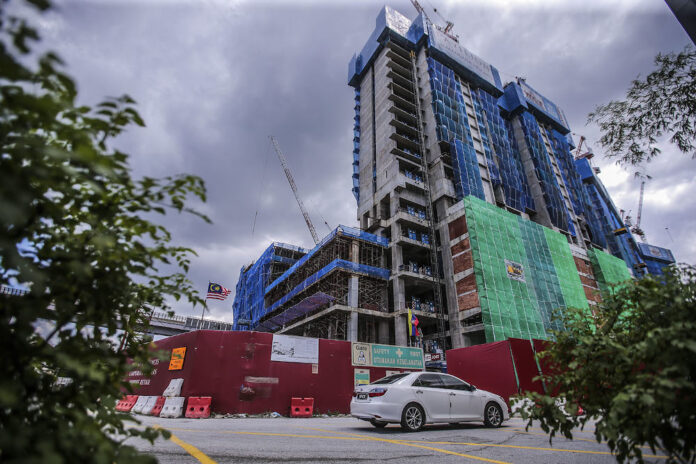A general view of the Pavilion Damansara Heights construction site in Kuala Lumpur November 16, 2020. — Picture by Hari Anggara
KUALA LUMPUR, Oct 21 — Housing developers revealed today that it could take anywhere from half a year to two years for the Malaysian property market to fully recover from the tumultuous effects of the Covid-19 pandemic.
Real Estate & Housing Developers’ Association Malaysia (Rehda) president Datuk Soam Heng Choon said 83 per cent of 180 respondents across peninsula Malaysia opined as such when polled.
“Six months means by March to April next year, and for 24 months, we will go into 2023 which they anticipated,” he said during a virtual media briefing on the Rehda Property Industry Survey for the first half of 2021 and its market outlook on the second half of 2021.
According to the survey, 48 per cent of respondents answered six to 12 months, while 35 per cent of them answered 13 to 24 months.
A total of 13 per cent of respondents answered more than 24 months for a full recovery of the property market to take place.
He said there was increased optimism for the property industry outlook for the first half of 2022 (1H 2022) as compared to the second half of 2021 (2H 2021) through the survey findings.
“In terms of property market and sales performance, 63 per cent said they were optimistic and in terms of residential sector growth, 69 per cent said they were optimistic,” he said, adding that respondents anticipate an increase in buyers as the broader economic situation improves.
This was a stark contrast to the respondents’ property market outlook for 2H 2021, where 70 per cent said they were pessimistic, Soam also revealed.
Further affirming the respondents’ pessimistic outlook for 2H 2021, Soam said 64 per cent revealed that they will not be launching their projects in this period, with 40 per cent stating unfavourable market conditions as one of the key reasons.
Soam also said 59 per cent of the respondents said the government-imposed movement control order (MCO) and its subsequent extensions have severely impacted the progress of their ongoing construction projects, while 53 per cent of them also agreed that their sales in the third quarter of 2021 have been severely affected.
Separately, despite the increase in prices of raw construction materials, Soam said it was unlikely to be passed on to housing prices as this is expected to normalise in the next few months.
In the survey, 72 per cent of respondents said the overall cost of doing business has increased in the first half of 2021 (1H 2021) when compared to the previous period under review.
Material and labour cost topped the list of factors affecting developers’ cash flow within the period under review, followed by compliance cost and financing cost.
“The increase in the price of raw materials is due to two main things, because of global commodities and the effect on it from the pandemic and the demand for materials in the country.
“For example when the lockdown was implemented, brick factories were not allowed to open but the construction of major infrastructures continued, which caused them to draw from the stockpile.
“So there has been more demand than supply and these factories need time to run and build up stockpiles which causes prices to go up. On this front we are not too concerned as it will normalise in the next couple of months,” he said.
However, he did not dismiss the possibility of government intervention should material cost problems be prolonged and worsen.
While industry players have always advocated for a free market, Soam noted that the global phenomena such as fluctuating commodity prices of oil, copper, bauxite (to manufacture aluminium), and iron ore (to manufacture steel) over the past 12 months have been inevitable and beyond Rehda’s control.
When asked further if house prices will inevitably increase due to more expensive material costs, Soam reserved his comment and said he was in no position to speculate at this current moment as the association will continue to monitor the current situation.
“But going forward if this phenomenon continues, the developer has no other choice but to pass on their cost.
“First they will reduce margin, and the margin then becomes very compressed and everybody in the supply chain will feel this effect and then once they cannot take in the additional costs, they have no other choice but to pass them on,” he added.
According to the survey, the top three performers by type of homes sold for 1H 2021 were multi-storey terrace homes at 2,312 units, followed by single-storey terrace at 601 units, and apartment or condominium with 503 units.
In terms of price range, the most launched selling prices were those between RM250,001 and RM500,000.
In terms of buyer’s profile, most are first-time local purchasers mainly for the purpose of residency.


